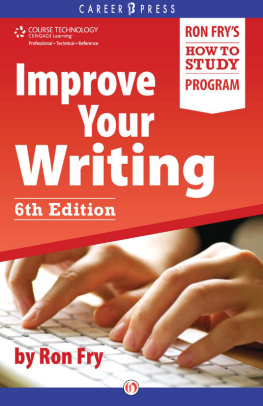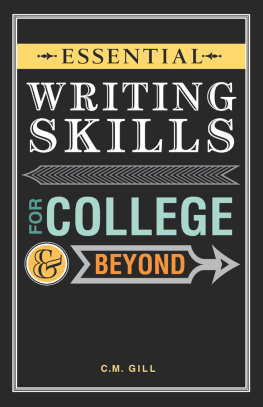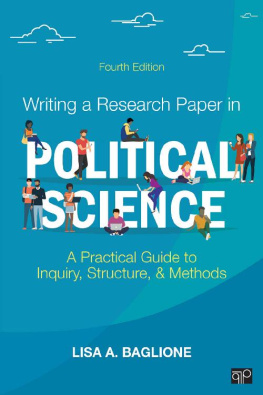
IMPROVE YOUR WRITING
SIXTH EDITION
Ron Fry

CONTENTS
FOREWORD
WRITE ON!
Reading and organizational skills are the twin foundations of any study program. And preparing a quality research paper requires mastery of both. What it does not require is the ability to write like a pro. In fact, too many students spend far too much time with their thesauruses trying to utilize the most multisyllabic words.
Improve Your Writing does talk about writing and will help you improve it. But more importantly, it will help you learn how to organize and communicate your ideas and the fruits of your research. And that is the basis of an A+ paper.
Students must improve their writing, not only to get good grades, but also because many college applications and entrance exams such as the SAT include an essay portion. So if you have trouble putting sentences and paragraphs together, nows the time to hone your writing skills.
The simple program developed in this book will work for students of any agenot just the high school students I always thought were my readers, but also college students, middle school students, and adults returning to school. All too many of you are parents with the same lament: How do I get Johnny to do better in school? His idea of researching a paper is skimming the CliffsNotes!
If you are in high school, I wrote this book with you in mind! While you may have prepared book reports, projects, and short papers in junior high or middle school, you can count on being assigned 10- to 15-page papers with some regularity during high school. And if youre planning to go on to college, I guarantee you must master these skills.
What Can Parents Do?
Writing papers (along with note taking and time management, I think) is one of the skills many teachers seem to assume students can simply learn by osmosis. While term papers are virtually automatic in every English, history, and social studies class from ninth grade up, Ive yet to meet many teachers who take the time to teach a good note-taking system, for example, or simple techniques to organize a jumble of notes into a coherent, clearly written paper.
Its up to you to help. Thats right, you. Dont for a minute underestimate the importance of your commitment to your childs success: Your involvement in your childs education is absolutely essential to his or her eventual success, even if you were not a great student yourself, even if you never learned great study skills. You can learn now with your childnot only will it help him or her in school, it will help you on the job, whatever your field. Heres a solid game plan for students of any age:
1. Set up a homework area. Free of distraction, well lit, with all necessary supplies handy.
2. Set up a homework routine. When and where it gets done. Studies have clearly shown that students who establish a regular routine are better organized and, as a result, more successful.
3. Set homework priorities. Actually, just make the point that homework is the prioritybefore a date, before TV, before going out to play, whatever.
4. Make reading a habitfor them, certainly, but also for yourselves. Kids will inevitably do what you do, not what you say (even if you say not to do what you do).
5. Turn off the TV. Or at the very least, severely limit when and how much TV watching is appropriate. This may be the toughest suggestion to enforce. I know. I was once the parent of a teenager.
6. Talk to their teachers. Find out what your kids are supposed to be learning. If you dont know the books theyre supposed to be reading, whats expected of them in class, and how much homework they should be scheduling, you cant really give them the help they need.
7. Encourage and motivate, but dont nag them to do their homework. It doesnt work. The more you insist, the quicker they will tune you out.
8. Supervise their work, but dont fall into the trap of doing their homework. Checking (i.e., proofreading) a paper, for example, is a positive way to help your child in school. But if you simply put in corrections without your child learning from her mistakes, youre not helping her at allexcept in the belief that she is not responsible for her own work.
9. Praise them when they succeed, but dont overpraise them for mediocre work. Kids know when youre being insincere and, again, will quickly tune you out.
10. Convince them of reality. (This is for older students.) Okay, Ill admit its almost as much of a stretch as turning off the TV, but learning and believing that the real world will not care about their grades, but will measure them by what they know and what they can do, is a lesson that will save many tears (probably yours). Its probably never too early to (carefully) let your boy or girl genius get the message that life is not fair.
11. If you can afford it, get your kid(s) a computer and all the software they can handle. There really is no avoiding it: Your kids, whatever their ages, absolutely must be computer-savvy in order to survive in and after school.
12. Turn off the TV already!
13. Get online. The Internet is the greatest invention of our age and an unbelievable tool for students of any age. It is impossible for a student to succeed without well developed computer skills and access to the Internet.
14. But turn off IM (Instant Messaging) while doing homework. They will attempt to convince you that they can write a term paper, do their geometry homework, and IM their friends at the same time. Parents who believe this have also been persuaded that the best study area is in front of the TV. (Although they can manage to keep a dozen IM windows going at once. Really.)
Some Random Thoughts About Learning
Learning shouldnt be painful and certainly doesnt have to be boring, though its far too often both. Its not necessarily going to be painless, either. Sometimes you actually have to work hard to figure something out or get a project done. That is reality.
Its also reality that everything isnt readily apparent or easily understandable. Learning something slowly doesnt mean theres something wrong with you. It may be a subject that virtually everybody learns slowly.
A good student doesnt panic when something doesnt seem to be getting through the haze. He just takes his time, follows whatever steps he should, and remains confident that the light bulb will inevitably go on.
Parents often ask me, How can I motivate my teenager? My initial response is usually to say, If I knew the answer to that question, I would have retired very wealthy quite some time ago. However, I think there is an answer, but its not something parents can doits something you, the student, have to decide: Are you going to spend the school day interested and alert or just sit around being bored and resentful?
Its really that simple. Since you have to go to school anyway, why not develop the attitude that you might as well be active and learn as much as possible instead of being miserable? The difference between a C and an A or B for many students is, I firmly believe, merely a matter of wanting to do better. As I constantly stress in radio and TV interviews, inevitably you will leave school. And very quickly, youll discover the premium is on what you know and what you can do. Grades wont count anymore, and neither will tests. So you can learn it all now or regret it later.
Next page

















